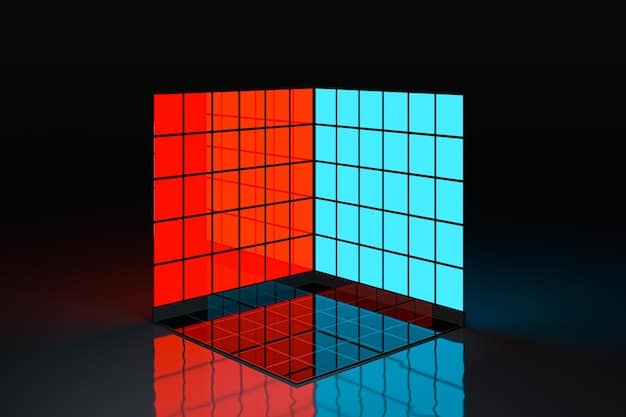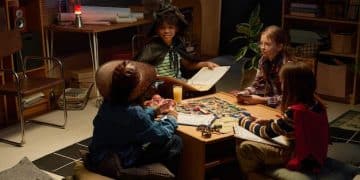The Power of Fan Theories: Showrunners Reacting to Audience Speculation
The Power of the Fan Theory: How Audience Speculation Influences Showrunners’ Decisions explores the dynamic relationship between audience theories and their impact on the creative choices of showrunners, highlighting instances where fan insights have altered or reinforced narrative directions in popular television series.
The allure of television often lies in its unpredictability, but what happens when the audience starts predicting plot twists and character arcs? The power of the fan theory: how audience speculation influences showrunners’ decisions is a complex interplay, where creativity meets anticipation, and sometimes, the fans win.
The Rise of Fan Theories and Online Communities
In the age of instant communication and interconnected online communities, fan theories have become a prominent aspect of popular culture. Fueled by platforms like Reddit, Twitter, and dedicated forums, viewers actively engage with their favorite shows, dissecting episodes, analyzing trailers, and constructing elaborate narratives about what might happen next. This culture of speculation not only enhances the viewing experience but also creates a feedback loop between audiences and creators.
But what makes fan theories so compelling? The appeal lies in the sense of ownership and participation. Viewers are no longer passive recipients of content; they become active contributors to the storytelling process.
The Psychology Behind Fan Theories
Several psychological factors contribute to the rise of fan theories. One key element is the human tendency to seek patterns and meaning in the world around us. Shows with complex plots and ambiguous characters provide fertile ground for speculation, leading viewers to fill in the gaps and create their own interpretations.
The Role of Social Media
Social media platforms have played a crucial role in amplifying fan theories. These platforms provide a space for fans to connect, share ideas, and collectively analyze shows. The rapid dissemination of information and the ability to engage directly with creators have transformed the landscape of audience participation.
- Enhanced Engagement: Fan theories deepen viewers’ connection to the show, encouraging them to invest more time and energy into analyzing the narrative.
- Community Building: Online forums and social media groups provide a sense of belonging for fans who share a common interest.
- Creative Outlet: Developing and sharing fan theories allows viewers to exercise their creativity and storytelling skills.
- Influence on the Narrative: In some cases, fan theories can influence the direction of the show, as showrunners take note of audience speculation and adapt their plans accordingly.
In conclusion, the phenomenon of fan theories is a reflection of our innate desire to understand and participate in the stories we consume. The rise of online communities and social media has amplified this trend, creating a dynamic interplay between audiences and creators that can shape the future of television.

Showrunners Listening: Real-World Examples
The internet is rife with anecdotes of fan theories gone wild – some accurate, some laughably outlandish. There are a few documented cases where showrunners have publicly acknowledged being influenced by audience speculation. This influence can manifest in various ways, from subtly altering character arcs to completely rewriting major plotlines.
But how exactly do showrunners engage with fan theories, and what are the ethical considerations involved?
Addressing Fan Backlash
Sometimes, showrunners use fan theories as a gauge for potential backlash. If a significant portion of the audience expresses dissatisfaction with a particular plot point or character decision, creators might reconsider their approach to avoid alienating viewers.
Seizing Opportunities
Conversely, showrunners may embrace fan theories that align with their creative vision or offer compelling new directions for the story. By incorporating popular fan ideas, creators can generate excitement and demonstrate that they are listening to their audience.
- Game of Thrones: Author George R.R. Martin is known to be aware of fan theories and has sometimes incorporated elements into his books.
- Lost: The show’s creators often acknowledged and sometimes incorporated fan theories into the plot.
- Mr. Robot: The show’s creator, Sam Esmail, has spoken about being influenced by online discussions while crafting the series.
Ultimately, the decision to embrace or reject fan theories depends on the specific show, the creative vision of the showrunners, and the potential impact on the overall narrative. When handled thoughtfully and ethically, this interplay can lead to more engaging and satisfying storytelling experiences for both creators and viewers.
The Ethical Line: Originality vs. Audience Expectations
One of the primary ethical dilemmas surrounding the influence of fan theories on showrunners’ decisions is the balance between originality and audience expectations. While catering to popular fan theories can be a way to engage and satisfy viewers, it raises questions about artistic integrity and the value of surprising or challenging audiences.
How much should showrunners prioritize originality over satisfying their audience?
The Risks of Catering Too Much to Fan Theories
While incorporating fan theories can boost viewership and create a sense of engagement, it also carries certain risks. Over-reliance on audience speculation can lead to predictable and formulaic storytelling, undermining the creative vision of the showrunners.
Striking a Balance
The ethical challenge lies in finding a balance between incorporating fan theories and maintaining originality. Showrunners need to be mindful of audience expectations while also staying true to their creative vision and ensuring that the story remains innovative and engaging.

Ultimately, the ethical responsibility rests on the shoulders of showrunners to navigate the complex terrain of audience expectations and creative integrity. When done thoughtfully and transparently, the interplay between audience speculation and artistic vision can lead to more rewarding and impactful storytelling experiences.
The Showrunner’s Perspective: Navigating the Noise
For showrunners, navigating the sea of fan theories can be a daunting task. It requires sifting through countless speculations, analyzing audience sentiment, and determining which ideas align with the overall creative vision of the show. This process can be both exhilarating and overwhelming, as creators grapple with the potential impact of audience speculation on their work.
How do showrunners manage this constant influx of information and maintain their creative vision in the face of audience expectations?
Setting Boundaries
One strategy is to establish clear boundaries between audience input and creative decision-making. Many showrunners choose to limit their exposure to fan theories, preferring to focus on their own vision for the show. This approach can help protect the integrity of the narrative and prevent audience expectations from overshadowing the creative process.
Engaging Selectively
Other showrunners take a more selective approach, engaging with fan theories in a measured and thoughtful way. They may monitor online discussions for trends and insights, but ultimately rely on their own judgment and expertise to guide the storytelling process.
- Maintaining Authenticity: Balancing audience expectations with the need to stay true to the original story.
- Handling Pressure: Dealing with the pressure to deliver satisfying conclusions to long-running mysteries.
- Creative Freedom: Preserving the freedom to surprise and challenge audiences without succumbing to formulaic storytelling.
The showrunner’s perspective is crucial in understanding the complex dynamics between audience expectations and creative integrity. By setting boundaries, engaging selectively, and focusing on their own vision for the show, showrunners can navigate the noise of fan theories and create compelling and authentic storytelling experiences.
The Future of Fan Theories and Showrunner Interaction
As technology continues to evolve and online communities become even more interconnected, the relationship between fan theories and showrunner decisions is likely to become even more dynamic and complex. In the future, we may see new forms of audience participation emerging, as well as more sophisticated tools for analyzing fan sentiment and predicting audience reactions.
What can we expect from the convergence of technology, fan theories and showrunners?
Interactive Storytelling
One possibility is the rise of interactive storytelling experiences, where viewers have the opportunity to directly influence the narrative through online polls, voting systems, or even co-creation platforms. This could lead to more collaborative and participatory forms of entertainment, blurring the line between creator and audience.
Data-Driven Decision-Making
Another possibility is the increasing use of data analytics to inform showrunner decisions. By analyzing online discussions, social media trends, and audience feedback, creators can gain insights into viewer preferences and tailor their stories accordingly.
- Augmented Reality: New immersive technologies could enhance the viewing experience and provide new avenues for fan interaction.
- AI-Powered Analytics: Data-driven tools could help showrunners better understand and respond to audience preferences.
- Collaborative Storytelling Platforms: Online platforms could facilitate co-creation between viewers and creators.
The future of fan theories and showrunner interaction is ripe with possibilities, as technology continues to reshape the landscape of entertainment. The key will be finding a balance between audience participation and creative integrity, ensuring that storytelling remains innovative, engaging, and authentic.
Case Studies: When Fan Theories Changed the Game
Several well-known television shows have experienced the transformative power of fan theories, with audiences influencing creative decisions in unexpected ways. These case studies offer valuable insights into the impact of audience speculation on showrunner decisions and the creative process.
Looking at specific examples, what can be learned about fan engagement?
The Curious Case of “Westworld”
HBO’s “Westworld” is a prime example of a show that attracted intense fan speculation. Viewers were quick to dissect every scene and character, creating intricate theories about the show’s mysteries.
“Stranger Things” and the Power of Predictions
Netflix’s “Stranger Things” has also been influenced by fan theories. Viewers speculated about Eleven’s origins, the Upside Down, and the fate of various characters.
- Positive Reception: Embracing fan theories can boost viewership and create a sense of community.
- Creative Innovation: Showrunners can find inspiration in audience speculation and use it to enhance their own storytelling.
- Ethical Considerations: Creators must balance audience expectations with the need to maintain originality and artistic integrity.
When showrunners embrace fan theories thoughtfully and ethically, they can create more engaging and satisfying entertainment experiences for both themselves and their viewers.
| Key Point | Brief Description |
|---|---|
| 💡 Rise of Fan Theories | Driven by online communities and fueled by desire for engagement. |
| 🎬 Showrunners Listening | Creators sometimes adapt storylines based on popular speculations. |
| ⚖️ Ethical Balance | Originality vs. audience expectations; finding the middle ground. |
| 🔮 Future Trends | Interactive storytelling and data-driven decision-making will grow. |
Frequently Asked Questions
▼
A fan theory is a speculative explanation or interpretation of elements within a fictional narrative, developed by members of the audience. These theories often aim to fill in plot holes, predict future events, or offer alternative readings of characters and storylines.
▼
Showrunners discover fan theories through various online platforms like Reddit, Twitter, and dedicated forums. Additionally, media coverage of popular fan speculations often brings these theories to the attention of the show’s creators.
▼
Yes, fan theories can indeed influence a show’s direction. If a theory gains enough traction and aligns with the showrunners’ vision, they might incorporate elements of it into the storyline. This could involve altering character arcs or plot developments.
▼
The challenges include balancing originality with audience expectations, the risk of predictable storytelling, and maintaining artistic integrity. Showrunners must carefully consider how to incorporate fan theories without sacrificing their creative vision for the show.
▼
Absolutely. Showrunners often reject popular fan theories to maintain the element of surprise and stay true to their original creative plans. Discarding theories can sometimes lead to unexpected plot twists and richer storytelling.
Conclusion
In conclusion, the interplay between the power of the fan theory: how audience speculation influences showrunners’ decisions is a fascinating dance between creator intent and audience interpretation. As viewers become more active participants in the storytelling process, showrunners must navigate the delicate balance of honoring their own vision while acknowledging the desires and theories of their dedicated fan base.





